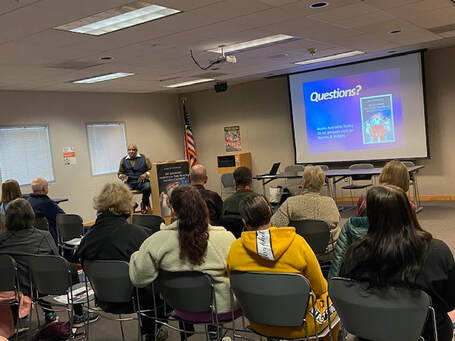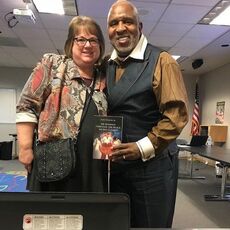 By Denise Stripes On the 29th of February, 2020, James Wilburn released his book, My Journey through the Black Sacred Cosmos, at the South Hill Library in Spokane, Washington. The first thing that Wilburn said, talking about his book, is “My book is not very wordy.” Reading the book, however, I was struck by the depth that can be found in a book that isn’t terribly “wordy.” Wilburn’s book is profound, and rife with paradox. When you meet James Wilburn, you encounter a kind, gentle, intelligent man, whose passion is for education—specifically, for ameliorating the racial inequalities that stem from the Eurocentric perspective in our public education system. But Wilburn’s childhood was steeped in a culture of unkindness, brutality, and the ignorance of those who would oppress people based on their skin color. Even his name becomes a paradox, because the name Wilburn came from people who owned Wilburn’s family, not from the family’s own rich heritage. When asked about this name, and how it affects him, Wilburn told how he keeps the name because it’s known, which is important for a person whose work is in the public eye. Thus, the name that was a slave name for his ancestors now represents Wilburn’s own work and livelihood. Wilburn, however, also has an African name, Adé Kunlé, which means “A Royal King (Adé) Fills Our Home With Honor (Kunlé).” Speaking of Wilburn’s African name, Dr. Nkosi Ajanaku, from the Future America Basic Research Institute, told Wilburn that he gave him that name because when he visited him, he filled his home with honor. Wilburn shared with his listeners some of the stories from his childhood that he includes in his book, ranging from interesting stories such as when his father would take James—aged ten or eleven years at the time—and his brother—age nine or ten—to Heck’s Service Station, where the two would do the hambone to earn some money for snacks, to heartbreaking accounts like when his father’s hotel was burned to the ground. But perhaps the most profound aspect of the book is found in the title itself, and what the Black Sacred Cosmos meant to Wilburn, as a child, and now, as an advocate for learning. In his book, Wilburn relates that “[g]rowing up entirely in an African American society leaves me void of any European American sacred experience. My experience growing up in the Jim Crow south leaves me void of any European American Faith-based ideology” (3). Talking to those of us at his book release, he expounded that children can grow up in the same community, attend the same church and the same schools, but see the world very differently. For Wilburn, the Black Sacred Cosmos “has everything to do with my sacred journey,” and his community at Sunset in Arkansas provided a haven, a shelter for the children from the oppression of the Jim Crow south, even if they could not shelter Wilburn and his siblings from the worst of the violence. In addition to this haven, his community provided the education he needed to “know and love himself,” so that “he could better understand and love others,” as stated in his biography on the book cover. Wilburn’s hope is to bring this message to children today, who, he says, need to learn the lesson much faster than he did as a child. Along with that hope, the book brings a message to the wider world, and, for me, is a source of insight into a time and a situation that history books cannot convey to those of us who not only never lived such a life, but have no cultural or familial context of our own to help us understand. Wilburn’s story is important, even though it isn’t wordy, not only for those whose ancestors lived its reality, but for all of us who can benefit from the insight of Wilburn’s Black Sacred Cosmos.
0 Comments
|
AUTHORRoberta Wilburn is an Inclusion Practitioner with over 35 years of experience working in higher education, and as a consultant in public and private K-12 schools, government, non-profit and community based organizations. She has conducted diversity, equity, and inclusion training regionally, nationally, and internationally. She is the author of books, chapters, and journal articles. Her work has been recognized with local and national awards. Some of her awards include the 2017 Insight Into Diversity Giving Back Award for Administrators in Higher Education, the YWCA Women of Achievement Carl Maxey Racial and social Justice Award, and the Heartwood Award for Cultural Enrichment and Community Service.
ASSOCIATE BLOGGERDenise Stripes has lived in Spokane, Washington for twenty years. She is a wife of a veteran and has three adult children. She is also an adjunct English instructor at Spokane Community College. She earned her doctorate in English Literature from Washington State University. Above all, Denise is a committed believer in Jesus Christ, and wishes to see justice in her community as Christ would show it. She is a firm advocate of the Courageous Conversation, and is honored to write guest blogs about the events facilitated by Wilburn and Associates, LLC.
Archives
April 2020
Categories |


 RSS Feed
RSS Feed